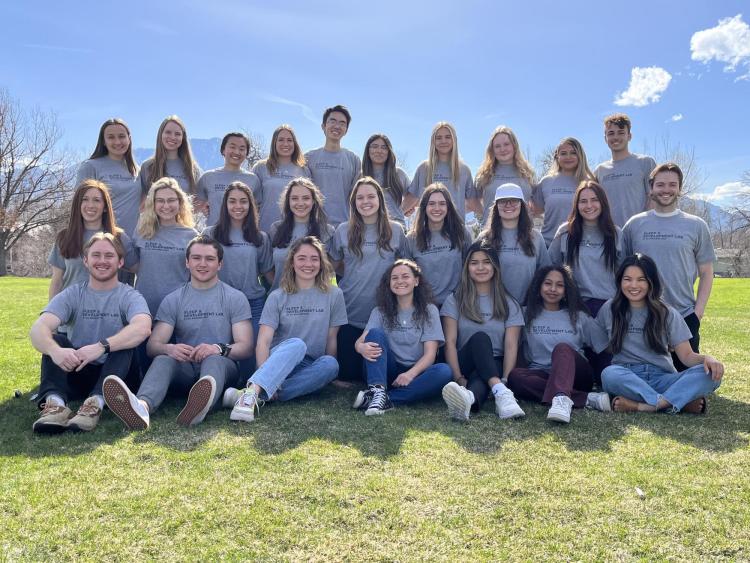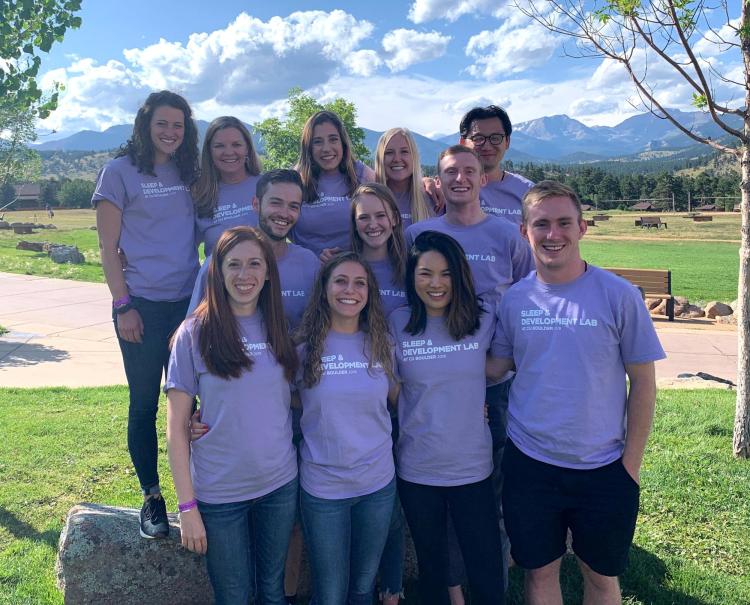‘Sleep Fairies’ complete a successful summer fellowship
CU Boulder’s Sleep and Development Lab’s summer fellowship provides hands-on training for undergrads while furthering research for the university
By Bradley Worrell
This past summer, 21 University of Colorado Boulder undergraduate students earned what could only be described as an unusual job title: Sleep Fairy.
It’s a designation the students received during the intensive 15-week Mary A. Carskadon (MAC) Sleep and Circadian Rhythms Summer Fellowship, which is sponsored by CU Boulder’s Sleep and Development Lab with funding from the National Institutes of Health and Undergraduate Research Opportunity Program student grants.
The fellowship had undergraduates working in small teams in the homes of children ages 3 through 5, conducting research on sleep and the circadian clock in early childhood development. That research bonded the undergraduates with their young subjects, who easily adopt the playful nickname for the researchers, according to Monique LeBourgeois, director of the Sleep and Development Lab and an associate professor of integrative physiology.
“The kids love calling us sleep fairies,” she says, describing it as a term of affection used by the child participants and their parents for the undergraduate researchers, who would spend days in the children’s homes as part of the data-collection process.

At the top of the page: Grad student Sachi Wong (left) and Lauren Hartstein, a postdoctoral researcher with the Sleep and Development Lab, are pictured in the home of two young children acting as test subjects. Above: Participants in the 15-week Mary A. Carskadon (MAC) Sleep and Circadian Rhythms Summer Fellowship are pictured here. Pictured from left to right are: (back row) Grace Zinser, Shelby Stowe, Jamie Siebring, Karolina Jasiak, Brandon Hiraki, Natalie Berrum-Ramirez, Morgan Matous, Saphie Potts, Wendoleen Acevedo and Aiden Kboudi; (middle row) Lauren Hartstein, Katie Wright, Jessica Bourgan, Jacy Dille, Sydney Pemberton, Sarah Powell, Taylor Dutton, Maddie Thorud and Trace Jablin; (front row) Jonah Wilson, Kevin Carter, Alexis Jaggi, Sophie Choubai, Sydney Mintalar, Leen Abbas and Sachi Wong (photo courtesy of Sleep and Development Lab).
But while the interactions between the students and child participants were deliberately lighthearted, with the student researchers making games out of their data collection efforts to entice the cooperation of their young subjects, LeBourgeois says the experience offers valuable, hands-on, real-world research experience for the undergraduate students.
Sophie Choubai, who participated in the summer fellowship after finishing her undergraduate degree in May, describes the experience as invaluable as she pursues her master’s degree. Her career goal is to become a research professor.
“My time in the summer fellowship was invaluable,” she says. “Starting off with no research experience under my belt, I was able to gain hands-on experience with data collection in the field, which later inspired me to pursue the graduate program. … Learning how to conduct research, as well as gaining a greater understanding of the physiology and mechanisms behind sleep and circadian rhythms, were instrumental in my decision to further pursue academia and helped me to expand my studies in integrative physiology.”
Maddie Thorud, who is working toward a career as a physician’s assistant, describes her experience in the summer fellowship in similar terms.
“The fellowship, for me, was one of my first health care research, science-related experiences during my time as a CU student,” she says. “There were a lot of close experiences dealing with these kids and their families in their homes, which is something that is definitely needed in a health-care setting. So, for me, not only did it show me that I want to do something in the future, where I’m working with patients and helping, but I also got to see what real research was like.”
The study involved creating dim light conditions within a child’s home for three days. On the first and third evening of the in-home assessment, the child remained in dim light and on the second morning the child was exposed to light for one hour starting at their usual waketime. Saliva samples were taken frequently during both evenings and in the morning to measure the hormone melatonin.
The research work often proved challenging, according to Thorud.
“We (student researchers) are working together as a team to collect these challenging study samples, and we ask a lot of the kids that we’re collecting data from,” she says. “They are in the dark, they are a bit sleep restricted, and they have to chew on these dry cotton swabs. But our team was really creative and made it fun for the kids.”
“And these are children ages 3 to 5 years old. They are little guys, and we are asking them to do things that, even for adults, are very challenging,” adds LeBourgeois.
Each team was assigned to work certain days of the week—not always Monday through Friday, but often Saturday and Sunday—in research protocols that involve unusual schedules (early shifts may start at 5 a.m. and late shifts may end at midnight).
My time in the summer fellowship was invaluable.
Because of the varied hours of the sleep observation project, and because of other time demands of the intensive 15-week fellowship, LeBourgeois says CU Boulder student researchers were not allowed to work outside jobs or to take other classes.
In return for their efforts, student researchers receive a summer stipend of $4,000.
Fellowship bigger and better than ever
After a two-year hiatus because of COVID-19, this past summer marked the successful return of the summer fellowship.
LeBourgeois says re-starting the fellowship after a hiatus took some effort, for which she credits her core team, which includes newly minted grad students Leen Abbas and Choubai, PhD student Sachi Wong, lab manager Jonah Wilson, plus Lauren Hartstein, a postdoctoral researcher with the Sleep and Development Lab.
The fellowship has grown over its short, three-year existence, from 10 fellowship participants in its first year, to 15 in its second year, to 21 this past summer, thanks in part to additional grant funding, according to LeBourgeois. In its first year, more than 100 students applied for the fellowship, and interest in the fellowship has only grown since then, she adds.

This photo from 2019 shows members of the Sleep and Development Lab core team. Pictured here from left to right are: (back row) Georgia Reis, Monique LeBourgeois, Taylor Teske, Allie Coy and Dan Lee; (middle row) Trace Jablin, Annie Waddle and Liam Canty; (front row) Lauren Hartstein, Elise Shalowitz, Sachi Wong and Jonah Wilson (photo courtesy of Sleep and Development Lab).
During this past summer’s fellowship, it was possible to conduct two sleep research projects, compared to one in each of the prior fellowships thanks to additional funding and student researchers, LeBourgeois says.
While the data collected with the children on the effects of light on the biological clock are an important part of the fellowship, that work represents just a portion of the entire summer.
Hartstein, who oversaw the day-to-day lab operations of the summer fellowship, says the undergraduates had additional responsibilities that include participating in community events to recruit children and families for future research studies and attending weekly meetings during the fellowship to discuss how the research is progressing and to review relevant scientific articles.
Additionally, at the end of the summer fellowship, the CU Boulder student researchers attend a retreat at YMCA of the Rockies in Granby, Colo., where they presented papers on what they learned from their research and had the opportunity to interact with faculty, scientific writers and junior investigators who could talk about their experiences as researchers as well as their career paths, which is always of interest to the student researchers, according to LeBourgeois.
“I always say that it’s part research conference and a little bit of summer camp, because it’s also a fun bonding experience,” Hartstein says. “It’s just a nice way for everybody in the team to come together at the end of the fellowship.”
At the retreat, some of the presentations given by the students have been so good that invited researchers and others couldn’t believe they were made by undergraduates, LeBourgeois says.
Thorud says she was impressed by the amount of personal development that happened among her fellow undergraduates during the 15-week fellowship this past summer.
“One of the most profound changes (relates to) accountability. They are freshmen, sophomores or juniors in college, and for a lot of them, this might be their first real job,” she says. “This is an opportunity for them to dip their toes into research and academia, but it’s also a job at the end of the day, where we need for them to be certain places on time and show responsibility. Even over the course of 15 weeks of the fellowship, so many of them progressed in the areas of responsibility and accountability.”
LeBourgeois concurs with that assessment.
“For me, it’s just a remarkable process to see these undergrads develop from the start of the fellowship to the end,” she says. “I’ve had many students tell me this was one of the most important experiences of their undergraduate career and that they gained many new insights both professionally and personally because of it.”
If you are interested in gifting funds to support undergraduate research experiences at the Sleep and Development Lab at CU Boulder, visit their website and click on Make a Donation.

